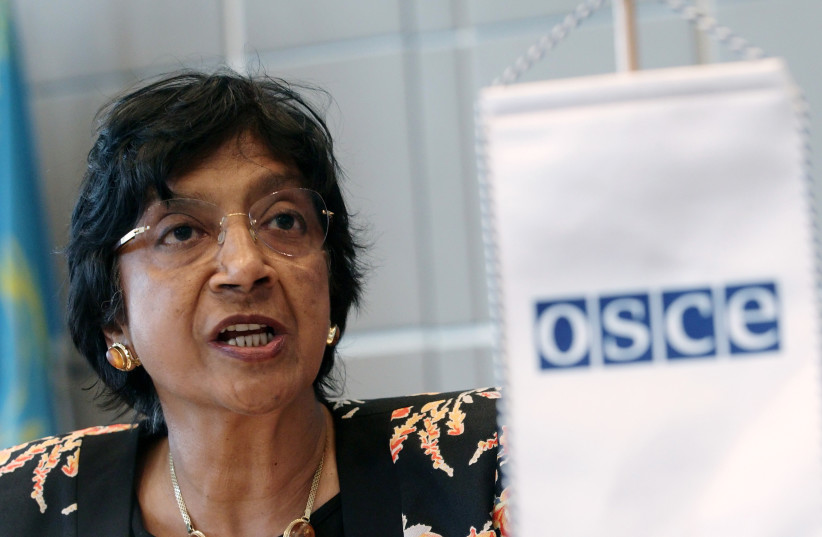Israel will not cooperate with the UN Human Rights Council’s Commission of Inquiry (COI) into alleged Israeli war crimes, Ambassador to International Institutions in Geneva Meirav Eilon Shahar wrote on Thursday.
“There is simply no reason to believe that Israel will receive reasonable, equitable and non-discriminatory treatment from the Council or from this [COI] that you were appointed to lead,” Eilon Shahar wrote to Navi Pillay, its commissioner.
The COI was established in the aftermath of the 11-day Gaza war and internecine rioting in May. It is unprecedented in its open-ended mandate – it can look into any alleged Israeli human rights violations in sovereign Israel, the West Bank and Gaza – and time frame, which could make it permanent. The UN General Assembly approved a budget of $4.1 million annually for the commission.
It is led by Pillay, the former UN high commissioner for human rights who appointed four fact-finding missions targeting Israel, more than any country, including the Goldstone Report, and convened the anti-Israel Durban II conference, which platformed then-president of Iran Mahmoud Ahmadinejad’s Holocaust denial, among other anti-Israel moves. She has called Israel an apartheid state and has advocated for the BDS movement.
“Israel engages on a frequent and regular basis with a wide range of international human rights bodies as part of its commitment to the rule of law and the advancement of human rights,” Eilon Shahar wrote. “At the same time, we expect such bodies to act in good faith, without bias and not in the service of a pre-determined political agenda. Regrettably, none of this can be expected from the COI.”

Eilon Shahar said the COI is clearly “designed to serve as a political tool, rather than an impartial investigative body,” and “is sure to be yet another sorry chapter in the efforts to demonize the State of Israel, distorting the factual and legal record, and hijacking the values, language and mechanisms of human rights in order to advance a partisan campaign,” the letter reads.
Eilon Shahar noted that the COI is borne out of a pattern of discriminatory behavior by the UNHRC, which has approved nine investigations of Israel, almost a third of all such bodies established by the council. Israel is also the only country with a permanent agenda item and special rapporteur, and is subject to more UNHRC condemnations than all other countries combined.
Though the COI was established in response to the conflict between Israel and Hamas, its mandate does not mention any terrorism by Hamas, which launched 4,300 rockets into Israeli civilian populations in May.
The COI’s “open-ended mandate... is effectively designed to investigate – in perpetuity – accusations against Israel since its inception,” the ambassador said. “By mandating the investigation of so-called ‘underlying root cause,’ the Council has cynically set the stage for the COI to... manipulate reality and selectively target Israel in an effort to delegitimize and even criminalize its very existence.”
Eilon Shahar pointed out that not only has Pillay publicly expressed hostile positions against Israel but so have the other two members of the COI, despite the UN’s rule to “ensure that the background candidates, prior public statements or political or other affiliations do not affect their independence or impartiality or create perceptions of bias.”
The ambassador argued that the members of the commission were “appointed because they were tainted with bias and based on their history of activism and hostile accusations against Israel, so as to guarantee a politically motivated outcome that is tailored in advance.”
As such, Eilon Shahar said, over half of the UNHRC’s members did not support the COI’s establishment.
The commission “will only contribute to the polarization between Israelis and Palestinians, distancing them further from... genuine peace and reconciliation,” she wrote.
The Foreign Ministry has listed the COI as part of a trend of international institutions trying to criminalize Israel and call it an apartheid state.
Foreign Minister Yair Lapid last month called the COI “total insanity.”
“Just so you understand the injustice,” Lapid said, “it has a budget of about [$4.1m.] a year and it has... 18 staff members... In Syria, half a million people were killed, and there was a war for 12 years, but the budget [for that inquiry] is $2.5m. and there are 12 staff members... That shows where this is going.”
State Department Principal Deputy Spokesperson Jalina Porter noted in January the “continued and egregious bias toward Israel in the HRC and the problematic nature of the open-ended duration of its mandate. The United States will not cooperate with the commission on inquiry, we encourage other member states to follow our lead, and we’ll continue to advocate for Israel to be treated fairly in the Human Rights Council.”
While the US will continue to cooperate with the UNHRC, she added, “it does have flaws, including most blatantly its agenda item focused only on Israel, which perpetuates unacceptable anti-Israel bias.”
